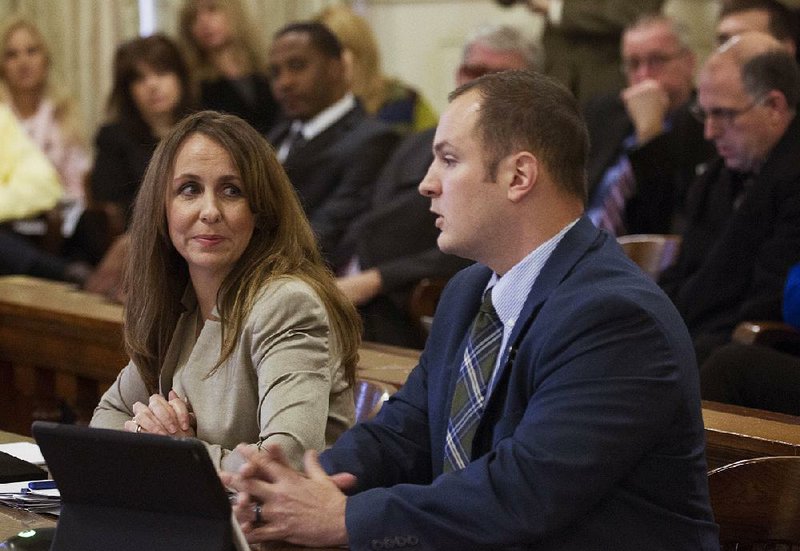A Senate committee Tuesday recommended for referral to voters a proposed constitutional amendment to limit attorneys' contingency fees and punitive damages, after earlier hearing the state's chief justice speak against the proposal's provision to give lawmakers control over court rules.
The proposal next goes to the full Senate. The Legislature can propose up to three constitutional amendments in this biennial regular session for voters to consider in the November 2018 election.
In a 5-3 vote at an afternoon meeting, the Senate State Agencies and Governmental Affairs Committee endorsed Senate Joint Resolution 8 by Sen. Missy Irvin, R-Mountain Home. The eight-member committee declined to advance the 10 other amendments proposed by senators.
Irvin said she plans to ask the Senate to approve her proposal Thursday. The House's approval also would be required to refer SJR8 to voters in the 2018 general election.
"SJR8 is a game changer for the state of Arkansas," Irvin said. "This will add more jobs for our citizens. It will grow our economy into a robust engine for greater economic development all across our state."
She said the measure would enhance health care in the state. By reducing legal judgments against health care providers, she said the cost of medical malpractice insurance would decrease. Irvin is marketing director for her husband's medical practice.
Arkansas Supreme Court Chief Justice Dan Kemp testified when the Senate State Agencies and Governmental Affairs Committee met Tuesday morning. He said the proposal would trample on the separation of powers between the Legislature and the judiciary.
Kemp, who took office in January, said the Supreme Court wouldn't deign to set rules in the House and Senate, but SJR8 would let lawmakers interfere with judges' decisions.
Among other things, the proposed amendment would make the Supreme Court's rules of pleading, practice and procedure for all courts "subject to approval by the General Assembly."
Under Amendment 28 of the state constitution, the Supreme Court "shall make rules regulating the practice of law and the professional conduct of attorneys at law."
But under Irvin's proposal, the Legislature, with a three-fifths vote in each chamber, would be able to approve, change or repeal a rule of pleading, practice or procedure now decided by the Supreme Court. The Legislature also would be able to adopt on its own initiative court rules.
"Each of our branches of government must have the ability to make the rules more effective for the efficient operation of proceedings for which we are responsible in the constitution," Kemp said. "That is why the Supreme Court and all members of the judicial branch react so strongly to this provision of the proposal."
Over several years, the state Supreme Court ruled that parts of tort-law changes enacted by the Legislature in 2003 were unconstitutional, including a $1 million limit on punitive-damages awards.
Irvin said the high court tossed parts of the law because it viewed them as infringing on the court's authority. She said the inclusion of the measure giving lawmakers control over judicial rules is necessary to implement tort reform.
"It's us preserving our right to be the policymaking branch of government," she said.
On Tuesday, lawmakers on the Senate State Agencies and Governmental Affairs Committee -- the majority of whom co-sponsored the proposed amendment -- questioned whether Kemp was overstating the rule's effect on the separation of powers principle.
The Arkansas Bar Association, which has said it was against the amendment, failed to pass a resolution last year supporting a nomination process for selecting Supreme Court justices.
The judges are now elected and run as nonpartisan candidates.
"A large percentage of the bar and trial lawyers wanted" justices to be nominated, said Sen. Eddie Joe Williams, R-Cabot, who is chairman of the committee. "Doesn't that just smack separation of powers in the face that we would allow ... the governor or the speaker to appoint Supreme Court justices? Doesn't that smack separation of powers in the face?"
Kemp said the issue could be viewed that way.
Sen. Bart Hester, R-Cave Springs, asked Kemp why lawmakers should trust the Supreme Court.
"Many people worked very hard to put a tort initiative on the ballot," Hester told Kemp. "The Supreme Court -- you weren't there -- said the people of Arkansas weren't smart enough to read and make their own decisions."
In October, the Supreme Court struck Issue 4, which would have mandated that the Legislature set a cap for "non-economic damages" of at least $250,000 in medical lawsuits.
In a unanimous ruling, the high court said that the term "non-economic damages" -- often described as monetary relief for pain and suffering -- was not properly defined for voters.
Kemp said the judiciary changes its rules slowly and carefully over time.
In addition to Irvin, SJR8 is co-sponsored by 14 senators. The Senate has 35 members.
In the 100-member House, the proposal has 53 co-sponsors, including 13 members of the 20-member House State Agencies and Governmental Affairs Committee, which recommends amendments to the House.
The Senate's proposed amendment comes on the heels of unsuccessful efforts to persuade the Legislature in 2013 and 2015 to refer similar proposals to voters.
In addition to giving the Legislature control over Supreme Court rules pertaining to pleading, practice and procedure, the proposal would limit attorneys' contingency fees -- money paid to a lawyer if a case is won -- and punitive damages.
Punitive damages for each claimant would be limited to $250,000 or three times the amount of compensatory damages awarded. The Legislature could, by a two-thirds vote, increase the limits.
Noneconomic damages -- in cases where losses don't have a clear monetary cost -- would be limited to $250,000 for each claimant and $500,000 for all beneficiaries of a deceased person. The Legislature could increase those limits with a two-thirds vote.
Sen. Bryan King, R-Green Forest, argued that juries should be allowed wide latitude to decide damages.
Lawyers and their clients should be able to make decisions about fees -- "not a politician," he said.
Lawmakers have filed a total of 31 constitutional amendments for legislative referral to voters in the 2018 general election.
The Legislature can refer up to three proposals to voters. New joint rules limit the Senate and the House to one each, and require the approval of the opposite chamber to prevail.
A Section on 02/15/2017
RELATED ARTICLES
http://www.arkansas…">Bill limiting judge immunity clears panel http://www.arkansas…">Bill on sex-choice abortions gains http://www.arkansas…">State Capitol briefs http://www.arkansas…">Calendar http://www.arkansas…">Sales-tax collection bill falls short in committeehttp://www.arkansas…">2 senators file framework for 'bathroom bill' http://www.arkansas…">N.C. governor offers 'bathroom bill' repeal



